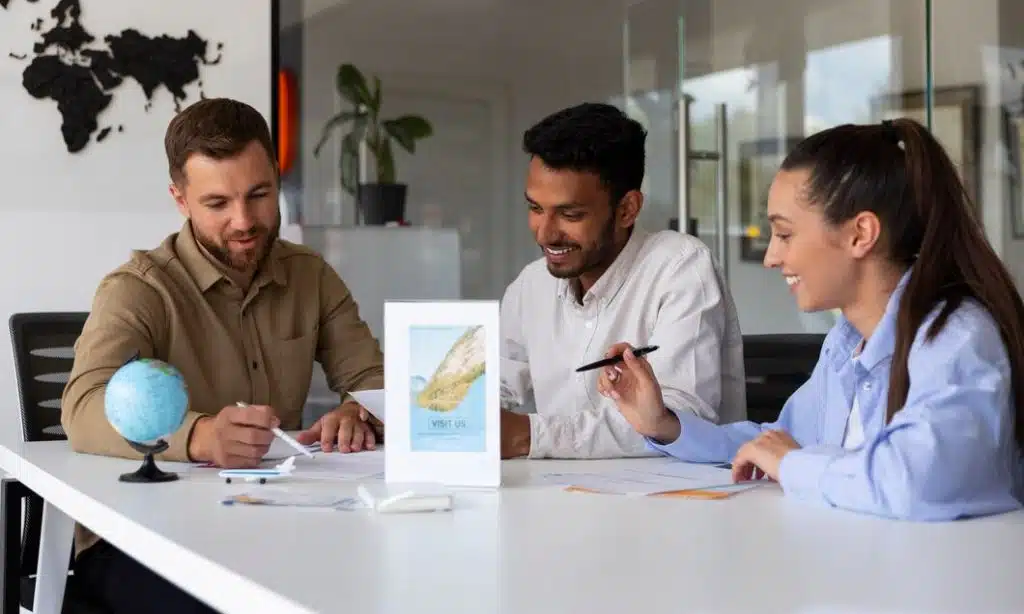Have you ever dreamed of owning a sun-soaked villa in Spain, a cozy apartment in Paris, or a beachfront condo in Thailand? You’re not alone. More people than ever are investing in properties abroad, whether for retirement, vacation homes, or investment opportunities. In fact, international real estate investments grew by 38% in 2023, showing just how popular this option has become.
But here’s the thing: while buying property abroad can be incredibly rewarding, it’s also a journey filled with unique challenges. Don’t worry, though – we’ve got you covered. In this comprehensive guide, we’ll walk you through 15 essential tips that will help you navigate the international property market like a pro.
Latest Market Trends: International Property Investment Hotspots 2024
| Country | Average Price per m² | Year-over-Year Growth | Popular Cities | Investment Potential Rating |
|---|---|---|---|---|
| Portugal | €2,500 – €3,800 | +8.5% | Lisbon, Porto, Algarve | 8.5/10 |
| Greece | €1,600 – €3,000 | +7.2% | Athens, Santorini, Crete | 8/10 |
| Mexico | €1,200 – €2,800 | +6.8% | Tulum, Puerto Vallarta, Merida | 7.8/10 |
| Malaysia | €1,800 – €3,200 | +4.5% | Kuala Lumpur, Penang, Johor | 7.5/10 |
| Spain | €2,200 – €4,500 | +5.3% | Madrid, Barcelona, Valencia | 7.8/10 |
15 Essential Tips for International Property Investment
1. Research Local Property Laws (The Foundation of Your Investment)
Think of local property laws as the rulebook for your investment game. Each country plays by different rules, and you need to know them all.
What you need to know:
- Ownership rights: Can foreigners own land outright? For example, in Thailand, foreigners can’t own land but can own condos
- Title deed systems: Some countries have multiple types of property titles
- Required permits: Many countries need special permissions for foreign buyers
- Property use restrictions: Some areas limit short-term rentals or commercial use
Real-world example: John, an American investor, almost lost $50,000 in a Mexican coastal property deal because he didn’t know about the fideicomiso (bank trust) requirement for foreigners buying near beaches.
2. Understand the Market Dynamics (Know Your Numbers)
Don’t just follow the crowd – understand why property values move the way they do.
Key metrics to track:
- Price trends over the past 5-10 years
- Rental yields (typically ranging from 3-8% annually)
- Local economic indicators
- Tourism statistics for vacation destinations
- New infrastructure projects
Pro tip: Create a spreadsheet comparing these metrics across different locations you’re considering. This makes it easier to spot opportunities and avoid overvalued markets.
3. Work with Local Professionals (Your Dream Team)
Think of this as assembling your international property A-team. Going solo might save money initially, but it often costs more in the long run.
Essential team members:
- Licensed real estate agent (specializing in international buyers)
- Local property lawyer
- Independent property surveyor
- Tax advisor with international expertise
- Currency exchange specialist
- Trusted translator (if needed)
Success story: Sarah from Canada saved €15,000 on her Portuguese property purchase because her local lawyer spotted irregular building permits that needed resolution before the sale.
Cost breakdown for professional services:
- Legal fees: 1-2% of purchase price
- Real estate agent: 2-6% (often paid by seller)
- Property survey: $500-2,000
- Tax advisor: $200-500 per consultation
4. Calculate Total Cost of Ownership (The Real Numbers)
Don’t just focus on the purchase price – that’s like seeing only the tip of the iceberg.
Complete cost checklist:
- Upfront costs:
- Purchase price
- Legal fees
- Property transfer tax (varies by country)
- Agency fees
- Survey costs
- Visa/residency permits
- Ongoing costs:
- Property taxes (annual)
- Insurance
- Utilities
- Maintenance
- Management fees
- Currency exchange costs
Real-world example: Tom’s €200,000 Spanish villa actually cost €236,000 after all fees and taxes. His annual running costs are about €6,000.
5. Explore Financing Options (Smart Money Moves)
Getting a mortgage abroad isn’t always as straightforward as at home, but you have options.
Financing possibilities:
- Local bank mortgages
- Typical requirements:
- 30-40% down payment
- Proof of income
- International credit check
- Life insurance (sometimes mandatory)
- Typical requirements:
- International property loans
- Benefits:
- Often in your home currency
- Familiar process
- No language barriers
- Drawbacks:
- Usually higher interest rates
- May require additional security
- Benefits:
- Developer financing
- Common in emerging markets
- Often more flexible terms
- Higher interest rates
- Shorter repayment periods
Pro tip: Some countries offer special mortgage programs for foreign buyers. For example, Portugal has specific mortgage products for Golden Visa investors.
6. Location Research (Beyond the Tourist Trail)
Never buy without visiting – photos can be deceiving, and Google Street View doesn’t tell the whole story.
Visit checklist:
- View property at different times:
- Early morning
- Rush hour
- Late evening
- Weekends
- Different seasons (if possible)
Neighborhood assessment:
- Walk the area extensively
- Talk to local residents
- Check noise levels
- Visit local shops/restaurants
- Test public transport
- Research future development plans
Case study: Mike loved his beachfront condo viewing in July but discovered the area was practically deserted in winter. This affected both rental potential and living quality.
7. Tax Planning (Keep More of Your Money)
Different countries, different tax systems. Plan ahead to avoid costly surprises.
Common property-related taxes:
- Purchase taxes:
- Transfer tax (1-10%)
- Stamp duty
- Registration fees
- Ongoing taxes:
- Property tax
- Income tax on rentals
- Wealth tax (in some countries)
- Sale taxes:
- Capital gains tax
- Value added tax
- Exit taxes
Tax-saving strategies:
- Use double taxation treaties
- Structure ownership correctly
- Time purchases/sales strategically
- Keep excellent records
- Consider corporate ownership
8. Title Verification (Protect Your Investment)
One mistake here can cost you everything. Take title verification seriously.
Essential checks:
- Property registry search
- Verify current ownership
- Check for liens/mortgages
- Confirm boundaries
- Review any restrictions
- Building compliance
- Planning permissions
- Building permits
- Certificates of occupancy
- Zoning regulations
Warning signs:
- Recent or frequent ownership changes
- Incomplete documentation
- Verbal assurances instead of paperwork
- Pressure to close quickly
- Unusually low prices
9. Property Management Planning (Your Eyes and Ears)
Whether it’s a vacation home or investment property, good management is crucial.
Management options:
- Self-managed
- Pros: Lower costs, direct control
- Cons: Time-consuming, requires local knowledge
- Professional management
- Costs: 10-15% of rental income
- Services typically include:
- Tenant screening
- Rent collection
- Maintenance coordination
- Regular inspections
- Financial reporting
- Hybrid approach
- Use professionals for key services
- Handle some tasks yourself
- Often most cost-effective
10. Visa Requirements (Your Access Pass)
Different countries have different rules about property ownership and residency.
Common visa options:
- Golden Visas
- Investment requirements:
- Portugal: €500,000
- Greece: €250,000
- Spain: €500,000
- Benefits:
- Residency rights
- Schengen area access
- Path to citizenship
- Investment requirements:
- Retirement visas
- Usually require:
- Proof of income
- Health insurance
- Clean criminal record
- Minimum age
- Usually require:
- Property owner visas
- Limited stay duration
- May need renewal
- Often don’t allow work
11. Currency Risk Management (Protect Your Profits)
Currency fluctuations can make or break your investment.
Risk management strategies:
- Fixed rate contracts
- Lock in exchange rates
- Secure against fluctuations
- Usually cost 1-2%
- Multi-currency mortgages
- Match loan to rental income currency
- Reduce exchange rate risk
- Available in major markets
- Forward contracts
- Pre-agree exchange rates
- Good for planned payments
- Require deposit
Case study: Linda saved $12,000 on her €300,000 French purchase by using a currency specialist instead of her bank.
12. Insurance Coverage (Sleep Well at Night)
Different countries have different risks and requirements.
Essential coverage:
- Property insurance
- Building coverage
- Contents insurance
- Natural disaster protection
- Liability coverage
- Specialized insurance
- Rental guarantee insurance
- Legal protection insurance
- Title insurance
- Vacant property coverage
Cost-saving tip: Bundle policies with one provider for discounts, but always compare with local options.
13. Exit Strategy Planning (Your Safety Net)
Always plan your exit before you enter.
Exit options to consider:
- Short-term flip (1-3 years)
- Focus on emerging areas
- Factor in all selling costs
- Consider market timing
- Medium-term hold (3-10 years)
- Rental income + appreciation
- Property improvements
- Market cycle planning
- Long-term investment (10+ years)
- Capital appreciation focus
- Rental income stream
- Potential retirement use
Exit preparation:
- Keep all documents organized
- Maintain the property well
- Build local relationships
- Monitor market conditions
- Stay compliant with local laws
14. Cultural Understanding (Bridge the Gap)
Success in international property often depends on cultural awareness.
Key areas to study:
- Business customs
- Negotiation styles
- Meeting protocols
- Communication preferences
- Decision-making processes
- Local practices
- Property viewing etiquette
- Contract traditions
- Payment customs
- Relationship building
- Communication strategies
- Learn basic language phrases
- Use professional translators
- Understand non-verbal cues
- Respect local holidays
Pro tip: Invest time in building relationships. Many markets value personal connections over quick transactions.
15. Assess Political and Economic Stability (Your Safety Net)
Think of this as your investment’s insurance policy. A stable country means a safer investment.
What to monitor:
- Credit ratings from major agencies
- Currency stability
- Foreign investment policies
- Property market regulations
- Local economic diversity
Warning signs to watch for:
- Sudden policy changes affecting foreign investors
- Rapid currency devaluation
- Political unrest
- Over-reliance on a single industry
Smart Investment Strategies by Budget
| Investment Budget | Recommended Strategies | Potential Locations | Expected Returns |
|---|---|---|---|
| Under $100,000 | Studio apartments in emerging markets | Southeast Asia, Eastern Europe | 6-8% annual rental yield |
| $100,000-$250,000 | 1-2 bedroom apartments in established markets | Southern Europe, Latin America | 4-6% annual rental yield |
| $250,000-$500,000 | Luxury apartments or small villas | Western Europe, Caribbean | 3-5% annual rental yield |
| $500,000+ | Premium properties or multiple units | Major global cities, resort locations | 2-4% annual rental yield + appreciation |
Takeaway: Your Path to Successful International Property Investment
Buying property abroad isn’t just about finding a great deal – it’s about creating opportunities for yourself and your future. Whether you’re dreaming of a retirement haven, a vacation escape, or a smart investment, success comes down to careful planning and informed decisions.
Remember: Every successful international property investor started exactly where you are now. By following these tips and doing your homework, you’re already ahead of the game. Take your time, build your knowledge, and don’t be afraid to ask for help from experts along the way.
Ready to start your international property journey? Begin with thorough research of your target market, connect with local experts, and always keep your long-term goals in mind. Your dream property abroad might be closer than you think!






































